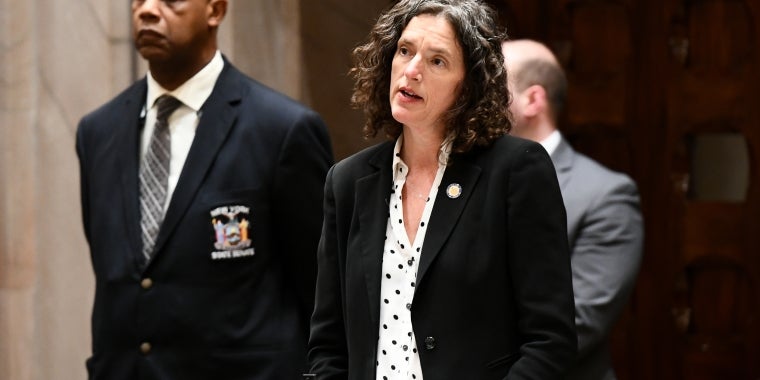
Metzger Bill to Prevent Illegal Over-Prescription of Opioids Passes Senate in Major Substance-Abuse Prevention Package
February 5, 2020

Albany, NY...Senator Metzger co-sponsored a package of bills addressing the opioid crisis, all of which passed in the New York State Senate yesterday, including a piece of legislation from Metzger (SD-42) that tackles illegal over-prescription. The bill, S.5653-A, directs the Department of Health to periodically examine data from the prescription drug monitoring registry to ensure there is no inappropriate or illegal prescribing, frequently referred to as “pill mills.”
In total, the Senate passed 17 bills to address different aspects of the opioid crisis, focusing on medical education and training, opioid-prescribing, access to overdose reversal medications, insurance, and access to evidence-based person-centered treatment, among other areas.
“Our work is in no way done, but we have taken an important step forward in this fight," said Senator Metzger. "The communities I represent have been deeply affected by the opioid crisis, with Ulster, Sullivan, Orange, and Delaware counties all facing staggering opioid-related death rates that far exceed the state average. There is no doubt that the package of opioid legislation passed will save lives.”
While the number of opioid prescriptions continue to decline, recent headlines highlight a small number of bad-apple physicians in New York who have illegally over-prescribed opioids to their patients.
New York's prescription monitoring program tracks all opioid prescriptions in the state, and Metzger’s bill will use that information to eliminate pill mills and the threat they pose to New Yorkers. “The Department of Health has data at its disposal to track flagrant over-prescribing of opioids, and the legislation I've introduced as part of this package will give the Department a valuable tool to crack down on this illegal practice and help prevent addiction and its devastating consequences,” said Senator Metzger.
Less than a year and a half ago, in October 2018, five doctors were arrested in New York for over-prescribing opioids to patients, including to patients with signs of substance use disorder. The prescriptions were given without appointments and at all hours of the night. The five doctors, alone, had prescribed 8.5 million opioid pills.
"I have the greatest respect for the medical profession and believe that these bad apples are exceptions to the rule, but we cannot afford any exceptions," said Senator Metzger. "They can cause out-sized harm and cost lives."
Metzger is also a co-sponsor of the following bills in the package passed:
Medical Education
- Expands SBIRT Program: This bill, S.2507, sponsored by Senator Anna Kaplan, requires OASAS to develop new training materials for use by qualified health professionals to encourage the screening, brief intervention, and referral to treatment (SBIRT) program beyond hospital emergency rooms.
- Training for Controlled Substance Prescribers: This bill, S.7102-A, sponsored by Senator Brian Benjamin, would require DOH to update the mandatory three-hour training for prescribers of controlled substances to include the most up-to-date guidance and evidence-based best practices.
Opioid Prescribing
- Access to Abuse Deterrent Formulations: This bill, S.6397, sponsored by Senator David Carlucci, will ensure that insurance plans cannot substitute non-abuse-deterrent drugs when an abuse-deterrent form is ordered and that insurance coverage does not disadvantage access for patients.
- Partial Fill Prescription: This bill, S.7115, sponsored by Senator Gustavo Rivera, would allow patients to request a partially filled prescription without limiting future access to the rest of the prescription.
- Opioid Antagonist Prescription: This bill, S.5150-B, sponsored by Senator Pete Harckham, will require prescribers to co-prescribe an opioid antagonist with the first opioid prescription of the year to combat accidental overdoses.
Access to Overdose Reversal Medications
- Take-Home Opioid Antagonist: This bill, S.6650, sponsored by Senator Pete Harckham, will require individuals diagnosed with an opioid use disorder who are discharged from treatment facilities, state prisons, and hospitals to be provided with an overdose reversal drug (such as naloxone) prior to discharge.
- Access to Life Insurance Coverage: This bill, S.3159-A, sponsored by Senator Pete Harckham, will prohibit insurers from denying life insurance to, or otherwise discriminating against, individuals who are prescribed an overdose reversal drug (such as naloxone), as many nurses and health care providers carry this lifesaving drug without a specific patient prescription.
- Use of Opioid Antagonist by Public Accommodations: This bill, S.5457, sponsored by Senator Pete Harckham, will expand the list of entities authorized to possess, distribute, and administer an overdose reversal drug (such as naloxone) to include public accommodations, such as restaurants and bars.
Ensuring Access to Evidence-Based, Person-Centered Treatment
- Substance Abuse Sensitivity Training: This bill, S.1063-A, sponsored by Senator Roxanne Persaud, will require SUD counselors to receive sensitivity training and up-to-date training on how to provide the best care to individuals suffering from an SUD and their families.
- Chemical Dependence Treatment Bill of Rights: This bill, S.4599, sponsored by Senator Kevin Parker, creates an explicit list of rights for patients receiving treatment in a SUD program that must be clearly placed throughout treatment facilities and given to every patient upon intake.
- “Stephen’s Law”: This bill, S.4741-B, sponsored by Senator Pete Harckham, will require treatment programs to notify patients of their right to identify emergency contacts and require OASAS to develop guidelines for protocols to be used by treatment programs in communicating with these contacts.
Recovery
- Recovery Living Task Force: This bill, S.4496-A, sponsored by Senator Monica Martinez, will establish the recovery living task force to develop best practice guidelines for recovery housing and offer recommendations for legislation to put these recommendations into practice.
Child Welfare
- Infant Recovery Centers: This bill, S.5480, sponsored by Senator Gustavo Rivera, will require that DOH and OASAS establish a pilot program with at least four infant recovery centers in areas of need in the state.



